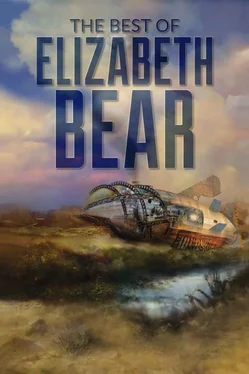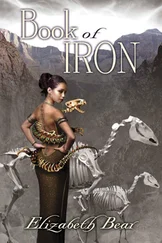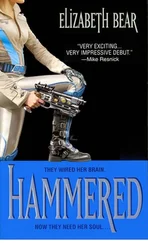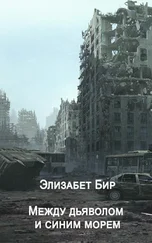They will come again, sang Orm the Radiant.
They have found the mother-cave, and they have machines to unearth us, like a badger from its sett, sang Orm the Terrible from his column of black and lavender jade.
We are not safe here anymore, sang Orm the Luminous. We will be scattered and lost. The song will end, will end.
His verse almost silenced them all. Their harmony guttered like a fire when the wind slicks across it, and for a moment Orm the Beautiful felt the quiet like a wire around his throat. It was broken by the discord of voices, a rising dissonance like a tuning orchestra, the Chord all frightened and in argument.
But Orm the Courtly raised her voice, and all listened. She was old in life and old in death, and wise beyond both in her singing. Let the warden decide.
Another agreed, another, voice after voice scaling into harmony.
And Orm the Beautiful sat back on his haunches, his tail flicked across his toes, his belly aching, and tried to pretend he had any idea at all how to protect the Chord from being unearthed and carted to the four corners of the world.
“I’ll think about it when I’ve digested,” he said, and lay down on his side with a sigh.
Around him the Chord sang agreement. They had not forgotten in death the essentialities of life.
With themen and their machines came memory. Orm the Beautiful, belly distended with iron and flesh, nevertheless slept with one eye open. His opalescence lit the mother-cave in hollow violets and crawling greens. The Chord sang around him, thinking while he dreamed. The dead did not rest, or dream.
They only sang and remembered.
The Chord was in harmony when he awoke. They had listened to his song while he slept, and while he stretched—sleek again, and the best part of a yard longer—he heard theirs as well, and learned from them what they had learned from his dinner.
More men would follow. The miners Orm the Beautiful had dined on knew they would not go unavenged. There would be more men, men like ants, with their weapons and their implements. And Orm the Beautiful was strong.
But he was old, and he was only one. And someone, surely, would soon recall that though steel had no power to harm Orm the Beautiful’s race, knapped flint or obsidian could slice him opal hide from opal bone.
The mother-cave was full of the corpses of dragons, a chain of song and memory stretching aeons. The Chord was rich in voices.
Orm the Beautiful had no way to move them all.
Orm the Numinous, who was eldest, was chosen to speak the evil news they all knew already. You must give us away, Orm the Beautiful.
Dragons arenot specifically disallowed in the airspace over Washington, D.C., but it must be said that Orm the Beautiful’s presence there was heartily discouraged. Nevertheless, he persevered, holding his flame and the lash of his wings, and succeeded in landing on the National Mall without destroying any of the attacking aircraft.
He touched down lightly in a clear space before the National Museum of Natural History, a helicopter hovering over his head and blowing his tendrils this way and that. There were men all over the grass and pavements. They scattered, screaming, nigh-irresistible prey. Orm the Beautiful’s tail-tip twitched with frustrated instinct, and he was obliged to stand on three legs and elaborately clean his off-side fore talons for several moments before he regained enough self-possession to settle his wings and ignore the scurrying morsels.
It was unlikely that he would set a conducive tone with the museum’s staff by eating a few as a prelude to conversation.
He stood quietly, inspecting his talons foot by foot and, incidentally, admiring the flashes of color that struck off his milk-pale hide in the glaring sun. When he had been still five minutes, he looked up to find a ring of men surrounding him, males and a few females, with bright metal in their hands and flashing on the chests of uniforms that were a black-blue dark as sodalite.
“Hello,” Orm the Beautiful said, in the language of his dinner, raising his voice to be heard over the clatter of the helicopter. “My name is Orm the Beautiful. I should like to speak to the curator, please.”
The helicopterwithdrew to circle, and the curator eventually produced was a female man. Orm the Beautiful wondered if that was due to some half-remembered legend about his folk’s preferences. Sopranos, in particular, had been popular among his kin in the days when they associated more freely with men.
She minced from the white-columned entry, down broad shallow steps between exhibits of petrified wood, and paused beyond the barricade of yellow tape and wooden sawhorses the blue-uniformed men had strung around Orm the Beautiful.
He had greatly enjoyed watching them evacuate the Mall.
The curator wore a dull suit and shoes that clicked, and her hair was twisted back on her neck. Little stones glinted in her earlobes: diamonds, cold and common and without song.
“I’m Katherine Samson,” she said, and hesitantly extended her tiny soft hand, half-retracted it, then doggedly thrust it forward again. “You wished to speak to me?”
“I am Orm the Beautiful,” Orm the Beautiful replied, and laid a cautious talon-tip against her palm. “I am here to beg your aid.”
She squinted up and he realized that the sun was behind him. If its own brilliance didn’t blind her pale man’s eyes, surely the light shattering on his scales would do the deed. He spread his wings to shade her, and the ring of blue-clad men flinched back as one—as if they were a Chord, though Orm the Beautiful knew they were not.
The curator, however, stood her ground.
His blue-white wings were translucent, and there was a hole in the leather of the left one, an ancient scar. It cast a ragged bright patch on the curator’s shoe, but the shade covered her face, and she lowered her eye-shading hand.
“Thank you,” she said. And then, contemplating him, she pushed the sawhorses apart. One of the blue men reached for her, but before he caught her arm, the curator was through the gap and standing in Orm the Beautiful’s shadow, her head craned back, her hair pulling free around her temples in soft wisps that reminded Orm the Beautiful of Orm the Radiant’s tawny tendrils. “You need my help? Uh, sir?”
Carefully, he lowered himself to his elbows, keeping the wings high. The curator was close enough to touch him now, and when he tilted his head to see her plainly, he found her staring up at him with the tip of her tongue protruding. He flicked his tongue in answer, tasting her scent.
She was frightened. But far more curious.
“Let me explain,” he said. And told her about the mother-cave, and the precious bones of his Chord, and the men who had come to steal them. He told her that they were dead, but they remembered, and if they were torn apart, carted off, their song and their memories would be shattered.
“It would be the end of my culture,” he said, and then he told her he was dying.
As he was speaking, his head had dipped lower, until he was almost murmuring in her ear. At some point, she’d laid one hand on his skull behind the horns and leaned close, and she seemed startled now to realize that she was touching him. She drew her hand back slowly, and stood staring at the tips of her fingers. “What is that singing?”
Читать дальше













